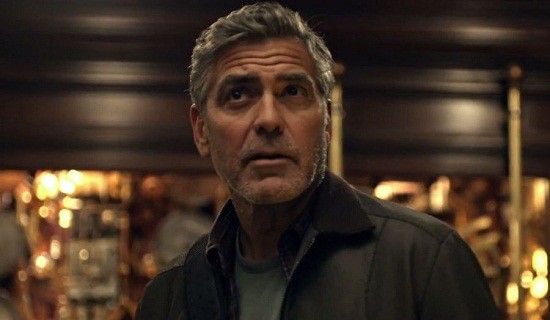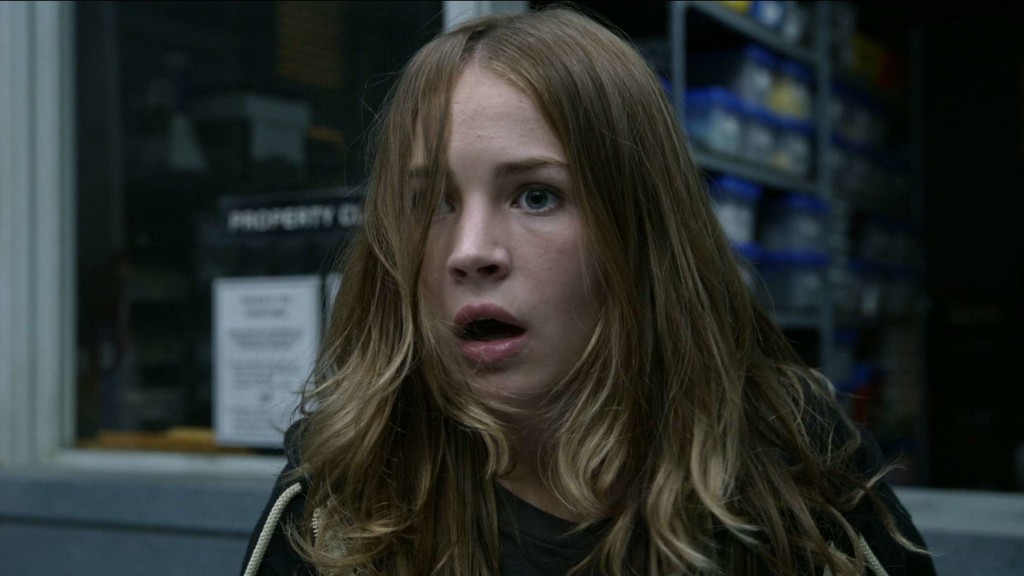Does Damon Lindelof’s infatuation with mystery boxes doom Tomorrowland?
Genre: Sci-fi/Adventure
Premise: A teenage girl finds a pin that allows her to visit a secret world of tomorrow.
About: Tomorrowland, directed by Brad Bird (The Incredibles), came out this weekend and finished the Memorial Holiday weekend with 40 million bucks, considered very low for what is, usually, one of the biggest movie-going weekends of the summer. Remember when 2015 was shaping up to be the biggest summer in movie history? Star Wars 7. Batman vs. Superman. Now we have films like Spy and Tomorrowland. What happened???
Writer: Damon Lindelof
Details: 130 minutes.
Pssst.
Hey.
Hey you.
Do me favor.
Come a little closer.
I have a secret I need to tell you. But you have to keep it between us.
Promise?
Pardon my paranoia. I just don’t want anybody to hear.
Are you ready?
I’ve never been a fan of Brad Bird.
I actually thought The Iron Giant was extremely overrated.
And The Incredibles?
I felt that every choice in that movie could be seen from a mile away.
I’ve always been kind of confused as to the geek love he’s been given. He made two movies that were amazing if you were ten. But other than that? He felt about as exciting as a wooden roller coaster.
Then I read that book about Pixar, “Imagination Inc.”, and the author went on and on about how in awe all of the biggest minds at Pixar were about Bird. And I thought, maybe I need to give this guy another chance.
On the other end of the spectrum, while the world seems to have given up on Damon Lindelof, I remain firmly in his corner. The guy literally came out of nowhere to write an entirely new third act and save the shit out of World War Z, preventing it from becoming one of very zombies it was depicting.
But regardless of who wrote this and who directed it, one thing was for certain: I was desperate for it to be good. I don’t know if you knew this, but Tomorrowland is one of only three major Hollywood releases this summer that are original ideas. A failure with this film was one more reason for studios to never choose original scripts again.
So when I sat down, I sat down hoping for a movie miracle. Did I get it?
Not exactly.
The story follows teenager Casey, a genius who uses her unique skills to take down power plants that are harming the environment or something.
After going to jail for said plant attackage, Casey receives a strange pin that, when touched, transports her to a futuristic city.
The problem is that the pin has a battery life worse than an Apple laptop and eventually runs out of juice, forcing her to run to the internet to find out how to power it up again. This leads her on a strange adventure cross-country where she eventually crosses paths with Athena, a 12 year-old girl who’s actually a robot FROM this futuristic city (which we’ve now dubbed Tomorrowland).
Athena takes Casey to Frank, a cranky old former inventor who, like Casey, visited Tomorrowland when he was young, and actually fell in love with Athena. The three of them have been assembled to save humanity, which, according to calculations, is going the way of the dodo birdy in 60 days. Only through the secrets of Tomorrowland will they be able to stop the apocalypse.
Oh man.
Where do I begin here?
I don’t know if I’d call Tomorrowland “bad.” But holy shit is it flawed.
I’ll start off with the strange decision to make this a tri-protagonist story. If you come to the site often, you know how I feel about this. Any scenario where it’s unclear who your protagonist is, is a “playing with fire” scenario. I’m not saying you’ll for sure get burned, but it’s a bit like heading to Egypt without sunscreen. You’re probably going to regret it.
Lindelof makes things really hard on himself as he creates a storyline that’s way more complicated than it needs to be, as Frank, Casey, and Athena take a good 70 minutes just to get to the point where they’re on their mission.
This essentially makes the 70-page mark the end of the first act (the beginning of the second act is well known as the moment our main character heads out on their journey).
Now Lindelof would probably argue that Casey goes off on HER mission around the traditional 25-minute First Act marker. But since that mission is really just the beginning of setting up two more characters (completing our tri-protagonist trio), we don’t get to the TRUE beginning of the journey until we meet Frank and he prepares the trip to Tomorrowland.
If you’re doubting my page 70 First Act turn assessment, I’d ask you how you were feeling 45 minutes into the movie. Bored right? Like we were spinning our wheels? Like we were moving from scene to scene, but nothing was really happening.
THIS IS BECAUSE we were still in the first act. We hadn’t officially gone on our journey yet.
Now this is where Lindelof is going to get some heat and he probably should. One of the big knocks on Lindelof is his and JJ’s “mystery box.” Critics say that he and Abrams are more interested in posing questions than offering answers, creating a sort of cinematic blue-ball effect.
This has caused some online to announce the death of the mystery box, which is the most absurd thing I’ve ever heard in my screenwriting life. It’s not mystery boxes that people don’t like. It’s badly executed mystery boxes.
It’s like that old screenwriting rule: never write a dialogue scene on the phone. Always have your characters talk in person instead. Well, yeah, that’s sort of true. But what audiences are really rebelling against are BADLY EXECUTED phone-call scenes. I don’t know anyone who had a problem with the Rod Tidwell phone scene in Jerry Maguire.
So anyway, I think Lindelof believed that his mystery boxes would keep us occupied inside those first 70 pages so that we wouldn’t notice he was writing the longest First Act in history.
There was only one problem. All the mystery boxes revolved around Tomorrowland, and we had already seen Tomorrowland twice. Once at the beginning with Frank and then once in the First Act with Casey. How do you create mystery around something we’re already familiar with?
There’s the whole “mysterious countdown” til earth blows up thing. But there’s a countdown in every Hollywood movie. You’re not going to keep us around with a standard countdown.
Your star mystery box was Tomorrowland and you blew that by throwing it into the very first scene. It was a baffling choice to say the least.
And as if to make things worse, when we finally get to Tomorrowland at the end, it’s a toned down lame version of Tomorrowland – the empty “unfun” version. So not only did you obliterate any curiosity about the place but when we finally see it, it doesn’t live up to our expectations.
The film’s message of “We can build a better tomorrow if we try” was given SO FREAKING MUCH ATTENTION that it appears Lindelof and Bird – two story-guys through and through – didn’t notice these flaws. Which is too bad. Because they really destroyed Tomorrowland. And made me happy I’m still back in Today.
[ ] what the hell did I just watch?
[x] wasn’t for me
[ ] worth the price of admission
[ ] impressive
[ ] genius
What I learned: Tomorrowland is a great example of what can happen when you oversell your theme. When you’re repeating your message every two pages (“We’re ruining the planet!”), and characters are stopping the script for long monologues about the message of the film, the audience starts feeling manipulated. A great way to avoid this while still pushing your theme, is to move away from stating theme, and look for ways to show theme. So say your theme is about pushing forward in the face of adversity. You don’t want one of your characters to say, “We need to push forward in the face of adversity guys!” Which is essentially the tactic that Tomorrowland employs. Instead, show a bunch of situations where characters are faced with adversity. Show some stand up to it and the power they achieve through doing so. Then show others fail to stand up, along with the negative consequences their actions bring. This is much more effective.



